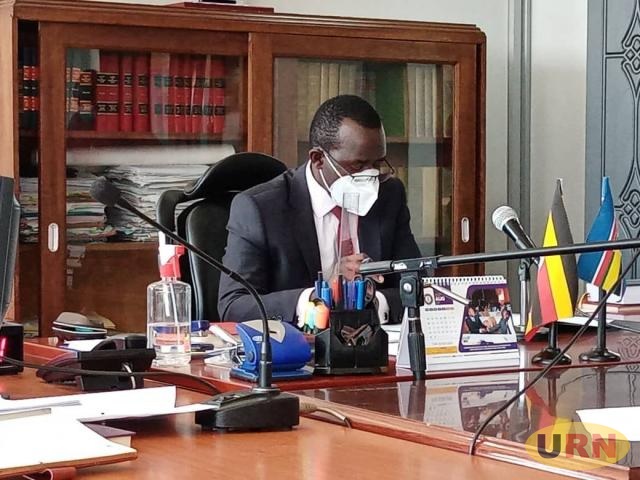
Kampala, Uganda | THE INDEPENDENT | The High Court has declared that the Government of Uganda has failed to put in place measures at various court premises to make them accessible to persons with disabilities.
Justice Phillip Odoki has also declared that such a failure violated and continues to violate their rights to equality and freedom from discrimination. As a consequence, the Court has ordered the government to take reasonable steps for the progressive realization of the rights of persons with disabilities in as far as access to justice is concerned and report to court within 3 years on the progress made in that regard.
The landmark judgement comes from a successful petition filed by Lawyer Emmanuel Candia in 2018 against the Attorney General.
Candia petitioned Court saying he is an Advocate practicing with Candia Advocates and Legal Consultants and that he is also a person with disability using a wheelchair for mobility.
He told the Judge that in his legal practice, he has appeared in several Courts in Uganda, but he has faced considerable difficulties, stress and discrimination in accessing the various Court premises because most of them lack ramps, lifts, rails, standard toilets or other reasonable accommodation for persons with disabilities with physical disabilities, especially those using calipers, crutches, wheelchairs and elderly persons.
Candia further told the Court that on May 15th 2018, he went to Mukono High Court circuit which was opened on 19th April 2018, to appear in three Civil Suits but he found that the Court had been shifted to a two storied building which has no ramps, lifts, rails or even convenient parking for Persons with Disabilities.
Court heard that in order to be effectively served, the court clerk had to move and attend to him at the foot of the stairs as it would be dangerous to lift him through the narrow staircase of the building to the 2nd floor where he could meet the clerk.
According to Candia, he also went to the High Court in Gulu when he was lifted to the 2nd floor and his wheelchair broke in the process and he had to buy a new one.
He cited another incident at the High Court in Kampala where a matter he was representing a client in was fixed for 9am and when he requested for Court to move to the ground floor, his case was handled at 1:50pm after other matters had been handled. He further cited another incidence at Supreme Court when he failed to personally appear and had to request to file written submissions but he failed to clarify issues arising from his written submissions before the Court.
It was Candia’s narration that in some instances, he briefs other advocates to appear on his behalf which offends his clients and some have ended up withdrawing their instructions from him. He gave the example of a case before the criminal Division of the high court where his client withdrew instructions from him after he failed to appear in court because the Judge had one time during hearing declined to move Court to a more convenient Court room on the ground floor where he could personally appear.
As such, Candia through his lawyer Eron Kiiza told the Judge that the majority of the court buildings fall short of the standards and requirements of accessibility provided for public places under Section 19 and 30 of The Persons with Disabilities Act, 2006.
He said that that failure by the government to put in place measures to make the courts accessible to persons with disabilities and elderly persons is a violation of their rights to equality and freedom from discrimination. In addition Candia said that the failure the failure in issue is a violation of his right to practice his profession and to carry on his occupation, trade and business as an advocate.
The Government on its part through the affidavit of Dr Christopher Ebal, the Commissioner in Charge of Engineering and Estates in the Judiciary who said they have not had ramps and other measures because of shortage of resources and also because some of the courts are hosted in rented premises.
As a result, Justice Odoki has agreed with the applicant and accordingly entered judgement in his favor. The Judge has also ruled that Candia’s right to practice his profession was violated.
Odoki thus made a declaration that the failure by the Respondent to put in place measures at the impugned court premises, to make them accessible to persons with disabilities, violated the Applicant’s right to practice his profession.
********
URN
 The Independent Uganda: You get the Truth we Pay the Price
The Independent Uganda: You get the Truth we Pay the Price


